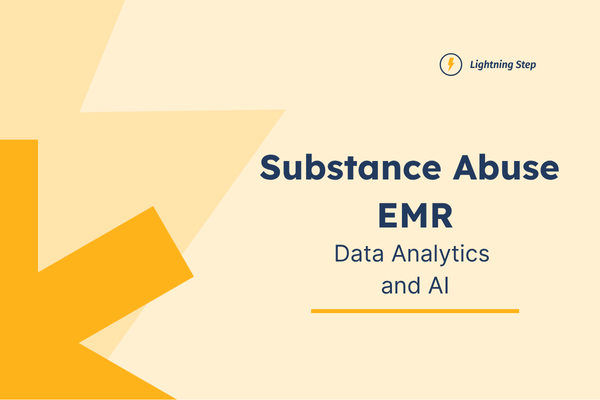
With only 14.6 percent of people with substance use disorders receiving treatment in 2023 and relapse rates between 40% and 60%, addiction treatment centers need technology that transforms outcomes, not just digitizes paperwork. Advanced substance abuse EMR systems now use data analytics and machine learning to predict relapse, personalize treatment plans, and save clinicians over 12.5 hours monthly on documentation tasks.
Traditional substance abuse EMR systems functioned as digital filing cabinets. Clinicians entered notes, stored assessments, and tracked appointments. Modern platforms transform this data into actionable intelligence.
Today's substance abuse EMR systems analyze patterns, predict outcomes, and guide treatment decisions. They move beyond documentation to become decision-support platforms that help clinicians deliver personalized care.
The treatment gap remains massive. 46.3 million people in the United States had a substance use disorder in 2021. Yet in 2021 only 6.3 percent of those individuals accessed treatment. Those who do face challenging relapse statistics.
Lightning Step leads this transformation with an integrated platform designed specifically for behavioral health and addiction treatment providers. Their approach combines comprehensive EMR functionality with advanced analytics and AI-powered insights.
By processing intake forms, assessment scales, and engagement metrics, data analytics converts raw records into actionable, personalized recovery roadmaps. Analytics segments patients by risk factors, treatment readiness, and historical outcomes. This segmentation allows providers to tailor interventions based on data-driven insights rather than intuition alone.
Lightning Step's platform provides real-time dashboards that track key performance indicators across patient populations. Custom reporting modules help administrators identify trends and allocate resources effectively. Clinicians access patient-specific analytics that highlight risk factors and treatment progress markers.
Machine learning algorithms analyze vast datasets to identify relapse risk patterns. These systems use risk scoring models and clustering techniques to forecast which patients face higher relapse probability.
Predictive alerts notify clinicians when patients exhibit concerning patterns. Early warning systems trigger interventions before crises occur. This proactive approach shifts treatment from reactive to preventive care.
Interpretable ML models have shown high accuracy in relapse prediction, helping clinical experts make better treatment decisions. Lightning Step's AI engine, LIA (Lightning Intelligent Assistant), learns from treatment outcomes to refine predictive models continuously. The platform is ISO 42001 certified, representing the first AI system in behavioral healthcare to achieve this certification standard.
Comprehensive data capture starts with seamless intake forms that feed directly into analytics engines. Progress notes and outcome scales integrate automatically, creating complete patient profiles without duplicate data entry.
Integrated CRM & RCM: Our admissions dashboard, call-tracking, and referral management (CRM) plus end-to-end billing and revenue management (RCM) ensure one unified workflow.
Telehealth and mobile integration enable remote monitoring and virtual check-ins. Patients access portals through mobile devices, maintaining engagement between appointments. Clinicians monitor progress through real-time data streams.
Interoperability connects treatment centers with labs, pharmacies, prescription drug monitoring programs, and other healthcare systems. Secure data exchange maintains patient privacy while enabling coordinated care.
Compliance and security features address both HIPAA requirements and 42 CFR Part 2 regulations specific to substance abuse treatment. LightningStep fully supports the updated Part 2 rule—single-consent authorizations and aligned breach-notification requirements. HHS Final Rule on 42 CFR Part 2. Encryption protects data in transit and at rest. Audit trails track all system access and modifications.
At Riverside Recovery Center, adopting LightningStep led to a 25 percent reduction in no-show rates and a 30 percent drop in relapse incidents within six months. Clinicians saved over 12.5 hours per month on documentation, allowing more time for patient care. Read the full case study.
Data migration from legacy systems requires careful planning to avoid data loss or duplication. Best practices include thorough data mapping, staged migration approaches, and comprehensive testing before going live.
Clinician training strategies focus on demonstrating immediate value rather than overwhelming users with features. Successful implementations emphasize how analytics and machine learning tools improve patient outcomes rather than adding administrative burden.
Data governance establishes clear policies for data access, sharing, and retention. Privacy safeguards protect sensitive information while enabling therapeutic use. Patient consent workflows ensure compliance with evolving regulations.
Blockchain technology promises secure data exchange between providers while maintaining patient privacy. This technology could solve interoperability challenges that currently limit coordinated care.
Wearable device integration offers continuous monitoring capabilities. Heart rate variability, sleep patterns, and activity levels provide objective measures of patient wellbeing between appointments.
Evolving interoperability standards and regulatory changes continue shaping EMR capabilities. The recent updates to 42 CFR Part 2 align substance abuse treatment records more closely with HIPAA requirements, simplifying compliance for integrated platforms.
The time for incremental improvements has passed. Providers need comprehensive solutions that address treatment gaps, reduce relapse rates, and support clinician wellbeing through intelligent automation and data-driven insights.
Lightning Step provides a comprehensive solution for providers seeking better patient outcomes through data-driven care. Their integrated platform combines EMR functionality with advanced analytics and AI-powered insights specifically designed for behavioral health and addiction treatment.
Ready to transform your treatment approach? Contact Lightning Step to explore demos and schedule a consultation. Additional resources provide detailed information about implementing advanced EMR systems in addiction treatment settings.



